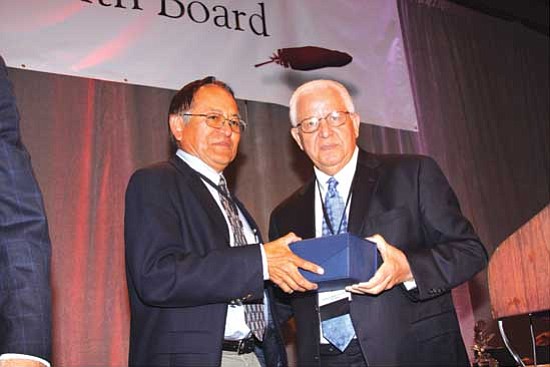Navajo health director receives impact award
WASHINGTON, D.C. - The executive director for the Navajo Division of Health received a national impact award at the awards luncheon during the 26th Annual National Indian Health Board Consumer Conference in Washington, D.C. on Sept. 16.
Anslem Roanhorse Jr. was among six recipients of the National Impact Award given to an individual or organization whose work has made an impact on American Indian/Alaska Native health care on a national level.
"It is a distinct honor of the National Indian Health Board to give this award in recognition of his leadership and commitment to help resolve a federal mandate that required proof of U.S. citizenship for Medicaid eligibility," said NIHB Vice Chairman Buford Rolin who represents the Nashville Area IHS.
"I am honored to receive this distinguished award and recognition for the hard work that we put into what was an uphill challenge since enactment of the Deficit Reduction Act in 2005 trying to find a mechanism by which the use of tribal enrollment documentation would be acceptable proof of U.S. citizenship for Medicaid eligibility," Roanhorse said.
"I serve as the Navajo Nation alternate representative on the Tribal Technical Assistance Group for the U.S. Centers for Medicare and Medicaid Services. Several years ago, the TTAG created a subcommittee to address the citizenship documentation requirement which I chaired and have had the privilege to work with a number of incredible individuals on that committee who understand the complexities of Medicaid requirements and are truly committed to ensure that our Native people have access to quality health care."
The U.S. Congress and then-President George W. Bush enacted the Deficit Reduction Act in 2005 which included a mandate that required individuals applying for or who were already on the Medicaid program to show proof of their U.S. citizenship by producing a number of acceptable documents, including a birth certificate.
The Navajo Division of Health became extremely concerned with the DRA requirement because majority of nearly 17,500 Navajo elderly population were born at home and do not have birth certificates.
There are about 85,000 Navajos enrolled in the Medicaid programs in Arizona, New Mexico and Utah, and the Navajo Area Indian Health Service and tribally operated health facilities known as "638 corporations" bill for and collect Medicaid reimbursement for health care provided to Medicaid beneficiaries.
In February 2009, the U.S. Congress and President Obama enacted the Children Health Insurance Program Reauthorization Act, which included the use of tribal enrollment documentation as evidence of U.S. citizenship for Medicaid eligibility.
Roanhorse and his subcommittee have worked diligently over the past several years developing strategies, working through complex issues and consistently advocating for the use of tribal enrollment documentation as proof of U.S. citizenship for Medicaid eligibility at every opportunity and forum.
"I dedicate this award bestowed on me to all past and present tribal leaders and my technical staff, health advocates and other individuals who have helped us educate and lobby the Congress and Federal and State government officials," Roanhorse said.
SUBMIT FEEDBACK
Click Below to:




